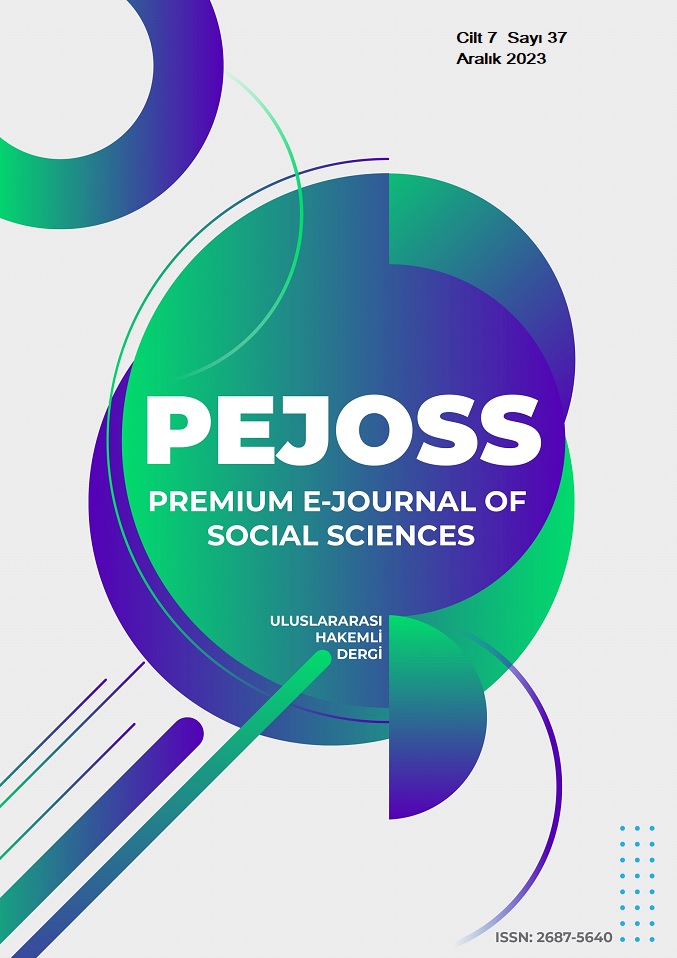The Problem Of Freedom In The Metaverse; Really? Is İt Fake?
DOI:
https://doi.org/10.5281/zenodo.10459317Keywords:
Metaverse, Freedom, Illusion, TroubleAbstract
In this study, the possibility of freedom, which is essentially a practical phenomenon within the artificial reality designed by human hands, is discussed. It is claimed that freedom, which can be defined as the privilege of choosing human behavior, taking moral action and designing, is difficult to achieve in the metaverse shaped within a number of technical patterns.
Freedom, whether considered in terms of action or thought, gains meaning through the choices the individual makes within the unlimited possibilities surrounding him. Situations in which opportunities or choices are restricted or absent indicate a structure in which the individual is spiritually and mentally restricted and lacks freedom.
It should be well understood that the unlimited freedom promised to the individual by the Metaverse's digital codes consisting of ones and zeros is under the control of those who write these codes or those who finance them and are shaped according to their wishes. In this context, it should be stated that freedom is no different from a mirage in the technological pattern that is controlled by other individuals.
In this study, it has been revealed that freedom is not a possibility within the scope of the metaverse, and that individuals' movements in the virtual universe are open to manipulation outside their own consciousness, and in this context, freedom may disappear within the digital pattern.
Downloads
References
Akarsu, B. (1994). Felsefe terimleri sözlüğü. İnkılap Kitabevi Yayınları.
Avcı, S. (2022). Bir heterotopya mekânı olarak metaverse gerçekliğinde kendilik anlayışının dönüşümü. Üsküdar Üniversitesi İletişim Fakültesi Akademik Dergisi, 5(10), 186-208.
Bayrı, D. (2011). Gözün Egemenliği Tarihin Sonu mu? ÖZNE Felsefe Dergisi: Baudrillard Sayısı, 14. Kitap, 93-104.
Berber, Ş. (2023). Metaverse ve işletmeler: mevcut uygulamalar-gelecek senaryoları. Anadolu Üniversitesi İktisadi ve İdari Bilimler Fakültesi Dergisi, 24(3), 598-631.
Biemel, W. (1984). Jean-Paul Sartre. Alan Yayınları.
Birer, G., C. (2022). Metavese. https://bilimteknik.tubitak.gov.tr/system/files/makale/meta.pdf.
Canan, S. (2015). Değişen be(y)nim. Tuti Kitap.
Damasio, M., Henriques, S., & Costa, C. (2012). Belonging to a community: forms of technological mediated belonging. Observatorio (OBS*) Journal, 127-146.
Dionisio, J. D. N., Burns, W. G., & Gilbert, R. (2013). 3D virtual worlds and the metaverse: Current status and future possibilities. ACM Computing Surveys, 45(3), 1-38.
Erdoğdu, A., T. (2022). Metaverse ve tarih (III) / Dijital Rönesans ile başlayan yeni özgürlük!. https://serbestiyet.com/gunun-yazilari/metaverse-ve-tarih-iii-dijital-ronesans-ile-baslayan-yeni-ozgurluk-79629/.
Fırıncı, T. (2004). "Özgürlük kavramı ve problem olarak özgürlük". Kaygı. Uludağ Üniversitesi Fen-Edebiyat Fakültesi Felsefe Dergisi, 3, 17-25.
Köse, M., ve Ç., M., Bakırcı (2021). Metaverse Nedir ve Neden Çok Önemlidir? Yaşamlarımızı Dijital Bir Evrene Taşıyabilir miyiz?. https://evrimagaci.org/metaverse-nedir-ve-neden-cok-onemlidir-yasamlarimizi-dijital-bir-evrene-tasiyabilir-miyiz-11135.
Kuçuradi, İ. (1997). Uludağ Konuşmaları-Özgürlük, Ahlak, Kültür Kavramları. Türkiye Felsefe Kurumu.
Kuş, O. (2021). Metaverse: dijital büyük patlamada’ fırsatlar ve endişelere yönelik algılar. Intermedia International e-Journal, 8(15), 245-266. Doi No: 10.21645/intermedia.2021.109.
Lee, L. H., Braud, T., Zhou, P., Wang, L., Xu, D., Lin, Z., Kumar, A., Bermejo, C. & Hui, P. (2021). All one needs to know about Metaverse: A complete survey on technological singularity, virtual ecosystem, and research agenda. Journal of Latex Class Files, 14(8), 1-66.
Öner, N. (1995). İnsan Hürriyeti. Vadi Yayınları.
Öztürk, K. (2002). Küresel iklim değişikliği ve Türkiye’ye olası etkileri. Gazi Eğitim Fakültesi Dergisi, 22(1), 47-65.
Robins, K. (2020). İmaj, görmenin kültür ve politikası. Ayrıntı Yayınları.
Stephenson, N. (1992). Snow Crash. Bantam Books.
Wang, S.,M., Yaqin, M., A., Hsu, F., H. (2022). Improving emotional ıntelligence in the new normal using metaverse applications for digital native. In International Conference on Human-Computer Interaction. Theoretical Approaches and Design Methods, Thematic Area, HCI 2022, Held as Part of the 24th HCI International Conference, HCII 2022, Virtual Event, Part I, pp.527-541.
Yakıcı, H. (2022). Metaverse: Özgürlük Mü Özgürlük Yanılsaması Mı? https://www.yeniduzen.com/ metaverse-ozgurluk-mu-ozgurluk-yanilsamasi-mi-18755yy.htm
Downloads
Published
How to Cite
Issue
Section
License
Copyright (c) 2023 Premium e-Journal of Social Science (PEJOSS)

This work is licensed under a Creative Commons Attribution 4.0 International License.


